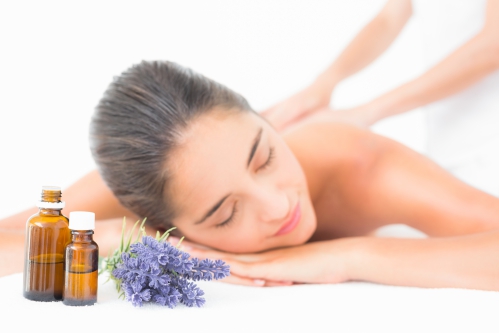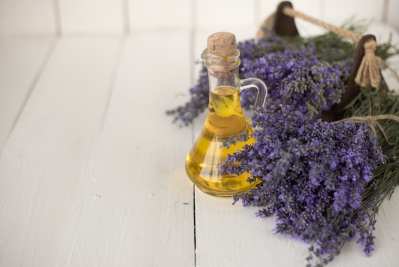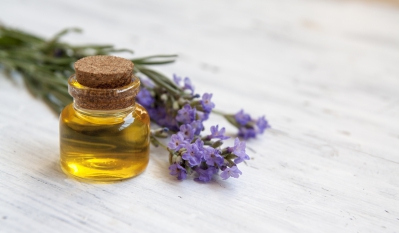Lavender is a very popular herb belongs to Lamiaceae family and its oil is known as lavender oil, an essential oil, derived from its flowers through distillation method. Lavender oil has been used for centuries for medicinal purposes and aromatherapy. It is well known for its ability of reducing pain, anxiety, insomnia and depression.
Nutritional composition
- It contains crude fat
- It contains various vitamins like Vitamin A, Vitamin C and Vitamin E
- It also contains several trace elements like calcium, zinc, copper, manganese but the content of trace elements differs because of its variety
- It contains phytosterol, coumaric acid, valeric acid, herniarin, tannin, glycolic acid, ursolic acid, coumarin and a pigment named anthocyanin
- It also contains several important bioactive compounds, which are responsible for exerting antimicrobial, antioxidant, anti-carcinogenic and anti-inflammatory activities as well as shows healing effects. These compounds include linalool, terpinen-4-ol, camphor, linalyl acetate, ß-caryophyllene, cis-ocimene, limonene, ß-pinene, geraniol, camphene, lavandulol
Health benefits
Role on preventing anxiety
- It has seen that lavender oil is associated with providing a soothing and relaxing effect to nervous system that helps to prevent stress, restlessness and anxiety
- It helps to reduce the score of confusion-bewilderment. It is a test conducted for assessing the magnitude of disorganization and confusion
- It also helps to reduce tension anxiety

Role on preventing depression
- Depression becomes one of the most serious health issues throughout the world and considered as one of the major causes of death. Lavender oil plays an important role in preventing this life-threatening health issue
- It helps to prevent depression by providing a calming and relaxing effect
- It also has strong sedative effects, which facilitates sleeping. It is considered as another important feature of lavender oil for reducing depression as insomnia is considered as a potential causative factor of depression
- It helps to improve the mood and helps to refresh the mental health

Role on relieving pain
- Lavender oil has strong analgesic effect, which helps to relieve pain
- It helps to decrease pain related with menstrual cycle
- It is also associated with reducing pain after surgery. It has seen that individual who inhales lavender oil experiences less pain. It can easily replace the effect of normal pain killers
- It has significant role on reducing labor pain
- Inhalation of lavender oil vapor helps to reduce the severe pain of migraine
- The anti-inflammatory effect of lavender oil is associated with reducing joint swelling and helps to reduce the pain of osteoarthritis and rheumatoid arthritis

Role on skin
- It has seen that inhalation of lavender oil or its application to skin or its consumption has great importance on improving the skin health
- It is associated with reducing acne and eczema
- It also helps to reduce wrinkles
- Calming effect of lavender oil helps to reduce skin irritation
- It also helps to reduce psoriasis (a skin disorder)
Role on hair
- It has seen that application of lavender oil on hair significantly reduces hair losses
- It helps to enhance hair growth and thickness
- It also helps to reduce dandruff
Role on wound healing
- Lavender oil helps in rapid wound healing by enhancing the formation of granulation tissues and by stimulating collagen synthesis
- It helps to increase epidermal growth factor that facilitates re-synthesizing of tissues at the site of wound
- Its pain relieving and wound healing properties are also associated with healing burns and insect bites
Antimicrobial activities
- It helps to prevent the growth of antibiotic resistant bacteria, virus and harmful fungus within host
- It basically helps to kill the vegetative cells of bacteria by weaken their cell wall that interferes with the microbial membrane permeability and leads to microbial cellular lysis
- Usages of lavender oil helps to decrease the prevalence of infectious diseases


Antioxidant and anti-inflammatory activities
- Caffeic acid and polyphenolic components of lavender oil act as strong antioxidant, which helps to prevent oxidative damages of the body by reducing free radical concentration
- It also helps to protect several important biological substances of body like DNA, RNA, proteins and fats from oxidation
- Beta-caryophyllene component of lavender oil act as potential anti-inflammatory substances and helps to prevent inflammation, swelling and pain
Anti-carcinogenic activity
- Lavender oil is associated with exerting strong anti-carcinogenic effects and helps to reduce the prevalence of cancers
- It helps to prevent malignant tumor growth
- Its cytotoxic effects and ability of enhancing apoptosis help to suppress the growth of cancerous cell and their metastasis
Therapeutic usages
- It has hypolipidemic activities that help to reduce cholesterol concentration within body hence can be used therapeutically for reducing the prevalence of atherosclerosis and for reducing elevated lipid profile
- It can be used to promote digestion as it helps to increase the secretion of gastric juice and bile
- It can also be used to treat various gastrointestinal complications like nausea, vomiting, colic pain, flatulence, diarrhea, stomach pain and abdominal discomfort
- It can be inhaled or applied to the chest or neck for preventing several respiratory disorders like normal cold, flu, sinus congestion, asthma, cough, throat infections, tonsils, bronchitis and laryngitis.
- It can be used to reduce hypertension as it enhances blood circulation
- It can also be used to treat neurological disorders such as Alzheimer’s’ disease
- It can be well utilized to prevent general weakness and fatigue
- Inhalation of lavender oil on cotton pad helps to reduce the tendency of nausea and vomiting after surgery

Recent findings
- Current studies have shown that inhalation of lavender oil (diluted) shows significant role on decreasing the level of pain experienced by patient undergo haemodialysis during their vascular access (Taşan et al., 2019)
- Various experimental researches and studies have been carried out on lavender oil and they have shown that inhalation or cold application of lavender oil is closely related with decreasing the discomfort and pain of removing post-surgical chest tube (in cardiac surgery). According to the research, two groups have taken, cases and controls. Lavender oil is provided only to cases. After removal of post-surgical test tubes, it has seen that individual who are administered by lavender oil (cases) significantly reduce their intensity of pain within 10 to 15 minutes after removal of chest tube (Hasanzadeh et al., 2016)
- Recent research has shown that lavender oil plays an important role on decreasing pre-surgical anxiety. It has seen that inhalation of 0.1 to 0.3 ml of lavender oil (diffused in 120ml of water), before one hour of orthognathic surgery (jaw surgery) significantly reduces anxiolytic effect within patients (Bozkurt and Vural, 2019)

Risk factors
- Individual who consume lavender by mouth often experiences headache, nausea, vomiting and enhanced appetite
- Individual who applied lavender oil on skin often experiences irritation, develops allergic reactions and skin rashes
- It is safe for adults to inhale lavender oil in smaller amount, but children should avoid it
- It has seen that excessive usage of lavender oil may interferes with the normal hormonal functions of boy and may develop gynecomastia
- Individual should avoid usage of lavender oil if they are on sedative drugs
- It is better not to use lavender oil during pregnancy and lactation

Source:
Ali-Shtayeh, M.S., Abu-Zaitoun, S.Y., Dudai, N. and Jamous, R.M., 2020. Downy Lavender Oil: A Promising Source of Antimicrobial, Antiobesity, and Anti-Alzheimer’s Disease Agents. Evidence-Based Complementary and Alternative Medicine, 2020.
Bozkurt, P. and Vural, Ç., 2019. Effect of Lavender Oil Inhalation on Reducing Presurgical Anxiety in Orthognathic Surgery Patients. Journal of Oral and Maxillofacial Surgery, 77(12), pp.2466-e1.
Cardia, G.F.E., Silva-Filho, S.E., Silva, E.L., Uchida, N.S., Cavalcante, H.A.O., Cassarotti, L.L., Salvadego, V.E.C., Spironello, R.A., Bersani-Amado, C.A. and Cuman, R.K.N., 2018. Effect of lavender (Lavandula angustifolia) essential oil on acute inflammatory response. Evidence-Based Complementary and Alternative Medicine, 2018.
Hasanzadeh, F., Kashouk, N.M., Amini, S., Asili, J., Emami, S.A., Vashani, H.B. and Sahebkar, A., 2016. The effect of cold application and lavender oil inhalation in cardiac surgery patients undergoing chest tube removal. EXCLI journal, 15, p.64.
Malcolm, B.J. and Tallian, K., 2017. Essential oil of lavender in anxiety disorders: Ready for prime time?. Mental Health Clinician, 7(4), pp.147-155.
Nichols, A., 2016. Lavender Oil: The New Sleep Aid (Doctoral dissertation).
Sharma, L., Chandra, M. and Ajmera, P., 2019. Health benefits of lavender (Lavandula angustifolia).
Taşan, E., Ovayolu, O. and Ovayolu, N., 2019. The effect of diluted lavender oil inhalation on pain development during vascular access among patients undergoing haemodialysis. Complementary therapies in clinical practice, 35, pp.177-182.


